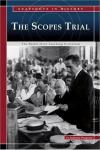When I was in eighth grade, we read Inherit the Wind in English class. Even when taught as literature, however, the idea that the play is inspired by the Scopes trial translates easily in young minds to the idea that they are more or less the same story, despite the fact that Inherit the Wind is about as historically accurate as Disney’s version of Pocahontas.
The addition of a book like Stephanie Fitzgerald’s The Scopes Trial to the pre-teen marketplace is therefore a boon to historically-minded educators, as well as parents who want to introduce their children to this exciting chapter in American history. Unfortunately, I would recommend a book like Fitzgerald’s The Scopes Trial, which itself has enough flaws that I cannot recommend it.
like Stephanie Fitzgerald’s The Scopes Trial to the pre-teen marketplace is therefore a boon to historically-minded educators, as well as parents who want to introduce their children to this exciting chapter in American history. Unfortunately, I would recommend a book like Fitzgerald’s The Scopes Trial, which itself has enough flaws that I cannot recommend it.
Certainly, there are things to be admired about the book. It is well-paced and attractive, evolution is treated as the only scientific explanation of life, and there is significant reliance on and reference to primary sources. However, certain elements of the book are less appealing.
The select bibliography includes Marvin Olasky and John Perry’s atrocious, pro–“intelligent design” Monkey Business: The True Story of the Scopes Trial (2005; reviewed in RNCSE 2006 May/Jun; 26 [3]: 45–6) among a collection of primary sources, while Edward J Larson’s definitive Summer for the Gods (1997) is conspicuously absent. Though there is no evidence that Fitzgerald is sympathetic to anti-evolutionists — quite the opposite, actually — the risk that students or teachers might use the select bibliography for further reading makes this a concern.
In pursuit of the laudable goal of balance, Fitzgerald may overstate the nobility of her subjects. She is sympathetic to the Tennessee government, downplaying their support of the bill:
[T]he people who voted on [the bill] did not feel very strongly about the issue. … The Tennessee House of Representatives approved the bill by a vote of 71–5. Those who voted for it probably expected the members of the Tennessee Senate to kill it. But when the bill got to the senate it was passed by a vote of 24–6. Most of the members of the senate expected Tennessee Governor Austin Peay to veto the bill. (p 32)
Peay also supposedly signed the bill for fear that failing to do so would prevent fundamentalists from supporting a tax increase to increase school funding.
On the other side, Fitzgerald avoids the anti-defense team attitude taken by Olasky and Perry as she describes Darrow as famous for being a defender of “the poorest and most downtrodden people”; while it is true that he had gained fame defending union members and political radicals, he also defended wealthy murderers, and it was for this that he was most famous by the time of the trial (Larson 1997: 71).
Though Fitzgerald makes motions towards dispelling some of the stereotypes about the trial and its players in the body of the text, in the first chapter she unfortunately plays into many of them for the purposes of summary: Bryan was fighting for the Bible! Darrow was fighting for truth and reason! Scopes was an evolutionist rebel! The people of Dayton were ignorant hillbillies! Though only the first two are directly stated, readers go into the rest of the book with their preconceptions reinforced — not the ideal mindset for absorbing new ideas.
This simplification is not limited to the trial itself. In the chapter summarizing the history of evolution, Fitzgerald follows a perfectly serviceable description of Lamarckian inheritance with the dismissal that Lamarck was “just dealing with guesswork and did not have any evidence to support [his] ideas” (p 24). Though this was a criticism leveled at him both in his own time and by some modern scientists, it ignores the nature of science in his era and the comprehensive nature of the framework he developed. While some simplification is necessary when summarizing the entire history of evolutionary theory in twelve pages, it does no one any favors to dismiss an important figure in the history of biology.
Perhaps the greatest weakness in the book is one of language choices that a casual reader would likely overlook entirely — which is exactly why it is so dangerous in a book for pre-teens, who almost certainly lack the background to read between the lines. The most obvious example to RNCSE readers is Fitzgerald’s repeated use of the cringe-inducing phrase “believe in” evolution — a common but sloppy expression which carries religious undertones (a better alternative is “accept evolution”). There is also a problem with language that means different things to scientists and non-scientists. For example, Fitzgerald claims that the discovery of Neanderthal skeletons “offered proof” of primitive humans, and Archaeopteryx “proved Darwin’s claim that birds had evolved from reptiles” (p 24). When dealing with an audience that is unfamiliar with the scientific process, to imply that scientific claims are proved true or false, and by a single piece of evidence, sets them up for misunderstanding basic scientific concepts later on.
Fitzgerald’s efforts are admirable, and there is no smoking gun in this book, no sentence one can point to and say, “There, that’s wrong.” And it is clear that her heart is in the right place. But all the small objections that might seem petty taken individually add up to a book that just doesn’t make the cut.
Volume: 30 Year: 2010 Issue: 3 Date: May-June Page(s): 38-39 Reviewer: Carrie Sager
